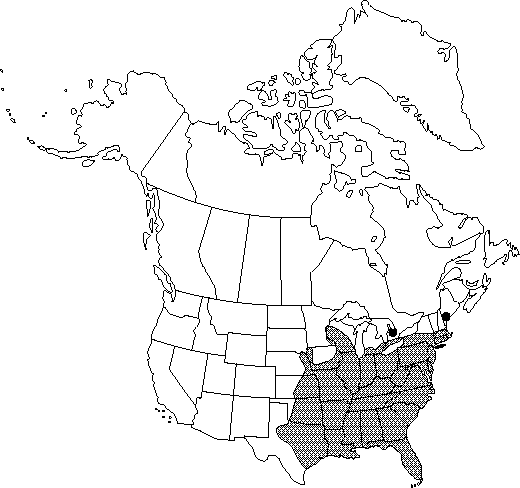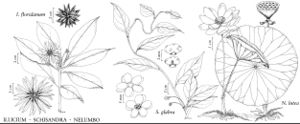Nelumbo lutea
Sp. Pl. 2: 1259. 1799 (as Nelumbium luteum).
Leaves: petiole to 2 m or more. Leaf-blade to 6 dm or more. Flowers: tepals pale-yellow, 1-13 cm, outermost 1-5 normally persistent; anthers 1-2 cm. Fruits somewhat globose, 10-16 × 8-13 mm, mostly less than 1.25 times longer than wide; receptacle to 1 dm diam. at maturity, abruptly narrowed ca. 1-2 cm below flattened top, base tapered, lateral surface usually distinctly striate. 2n = 16.
Phenology: Flowering late spring–summer.
Habitat: Mostly flood plains of major rivers in ponds, lakes, pools in marshes and swamps, and backwaters of reservoirs
Elevation: 0-400 m
Distribution

at other sites, Ont., Ala., Ark., Conn., Del., D.C., Fla., Ga., Ill., Ind., Iowa, Kans., Ky., La., Maine, Md., Mass., Mich., Minn., Miss., Mo., Nebr., N.J., N.Y., N.C., Ohio, Okla., Pa., R.I., S.C., Tenn., Tex., Va., W.Va., Wis., Mexico, West Indies (Cuba), West Indies (Jamaica), West Indies (and Hispaniola), Central America (Honduras)
Discussion
Nelumbo lutea is a species as magnificent as its Asian relative, N. nucifera, but it is less cultivated for ornament. It was probably originally confined to flood plains of major rivers and their tributaries in the east-central United States and carried northward and eastward by aborigines who used the seeds and tubers for food. The species is sometimes an aggressive, difficult-to-eradicate weed in ponds, lakes, and reservoirs.
Although Nelumbo lutea is often attributed to (Willdenow) Persoon, the spelling Nelumbium luteum used by Willdenow is an orthographic error for Nelumbo lutea (W. Greuter et al. 1994, Art. 61.4) that should be corrected, and Persoon's later combination is superfluous.
The name Nelumbo pentapetala (Walter) Fernald, sometimes used for this taxon, was based on Nymphaea pentapetala Walter, a name of uncertain application that has been recently proposed for rejection (J. H. Wiersema and J. L. Reveal 1991).
Selected References
None.
Lower Taxa
"dm" is not declared as a valid unit of measurement for this property.
